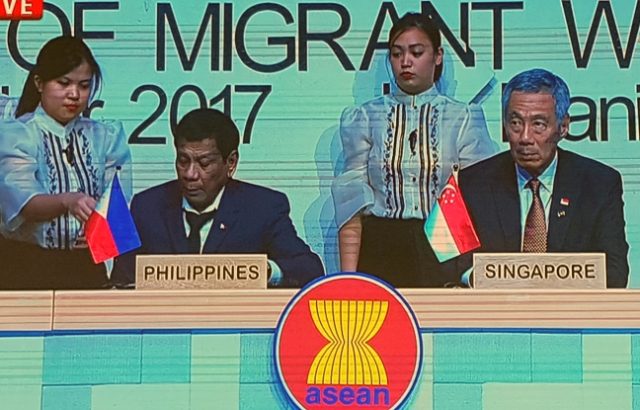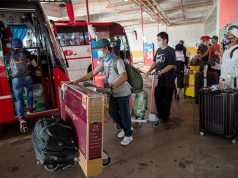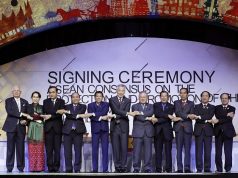
MANILA – Leaders of the 10 member states of the Association of Southeast Asian Nations (ASEAN) on Tuesday formally signed a consensus that would protect the rights of migrant workers.
At the signing ceremony, President Rodrigo Duterte presented to ASEAN Secretary General Le Luong Minh the recently adopted consensus document called the “ASEAN Consensus on the Promotion and Protection of the Rights of Migrant Workers”.
The Department of Foreign Affairs (DFA) has said the landmark document would further strengthen social protection, access to justice, humane and fair treatment, and access to health services for the migrant workers in the region.
The signed ASEAN consensus document has yet to be released in public.
Nearly seven million migrant workers employed within ASEAN member states – Brunei Darussalam, Cambodia, Indonesia, Lao People’s Democratic Republic, Malaysia, Myanmar, Philippines, Singapore, Thailand, and Vietnam – will be covered by the document.
The signing of the consensus came 10 years after the ASEAN Declaration on the Protection and Promotion of the Rights of Migrant Workers was adopted in 2007.
Prior to its signing, several groups and individuals had expressed both praises and concerns regarding the signing of the document, which had been described as the “centerpiece” of the Philippine chairmanship in this year’s ASEAN Summit.
The Blas F. Ople Policy Center said in a statement:
“The signing of the ASEAN Consensus on the Protection and Promotion of Rights of Migrant Workers is the heart of the Summit. It serves as a beacon for other regional blocs to follow. That it took place under the Philippine chairmanship of ASEAN manifests our country’s strong leadership role in promoting a rights-based approach to labor migration.”
“Given the enormous security and economic challenges confronting our allies in the Middle East, this consensus agreement shows that next to working within our borders, the next best thing may be to encourage our OFWs to look within our own region for legitimate jobs through proper, legal channels.”
“Next year, we expect this agreement to blossom into a concrete and practical action plan that would be acceptable to both labor-sending and labor-receiving countries within ASEAN. Foremost in that action plan should be the prevention of abuse and exploitation of ASEAN migrant workers – from passport confiscation, debt bondage, to undercutting of salaries and sexual violence as well as human trafficking.”
“Meanwhile, efforts to initiate, enhance and strengthen bilateral labor arrangements can draw inspiration from this historic agreement. We also call on the ASEAN Secretariat and our own government to embark on a massive information and education campaign so that multiple stakeholders including our own migrant workers would have a deeper understanding of what these consensus points are all about.”
“We in civil society appreciate the finer details and hard work that went into the signing of the ASEAN Consensus on the Protection and Promotion of Rights of Migrant Workers. Nevertheless, our journey and struggle continue, because we also need to get foreign employers and foreign recruitment agencies to cooperate in turning these consensus points into reality.”
Citizens’ Battle Against Corruption (CIBAC) party-list representative Sherwin Tugna said the signing of the ASEAN consensus was a “clear testament” to the regional bloc’s commitment of its vision to leave no one behind, especially migrant workers, in attaining sustainable economic growth.
“Through this agreement, ASEAN countries have manifested their resolve to strengthen the protection and promotion of rights of workers against exploitation and mistreatment,” Tugna said in a statement.
Meanwhile, migrant group Migrante International said the landmark document should be legally-binding in order to address the “lack of comprehensive legislative protection of migrant workers.”
“If the implementation is optional for member states, migrant workers will not be able to maximize its benefits wherever they may work or migrate, however strong the principles and provisions may be,” the group said in a statement
They hoped the document would also protect undocumented migrant workers, cover migrant workers’ families, and include migrant workers not from ASEAN countries.
As for the workers’ group Associated Labor Unions-Trade Union Congress of the Philippines (ALU-TUCP), the agreement was a positive step towards improved working conditions for migrant workers.
“We commend President Rodrigo Duterte for putting in the forefront of the Summit the welfare of 10 million migrant workers in ASEAN by ensuring that the consensus is signed among the first in the order of business,” Alan Tanjusay, spokesperson of the ALU-TUCP said in a statement.









